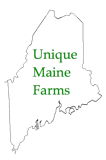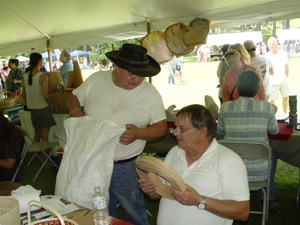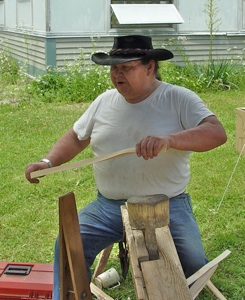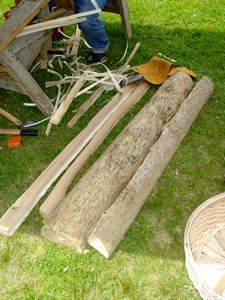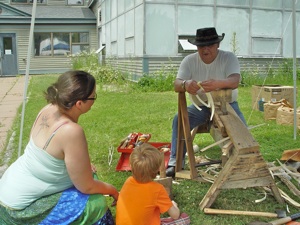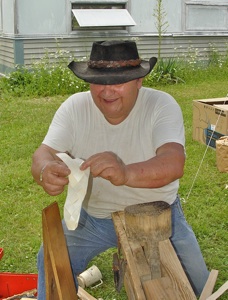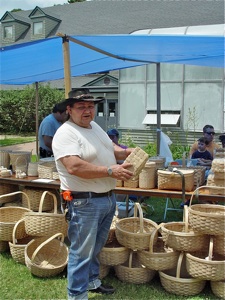The art of basketmaking was passed down in Eldon Hanning’s Micmac family for many generations. His mother hailed from Prince Edward Island where she learned the tradition from her parents. In an excellent video produced by the Hudson Museum, Eldon speaks about how his father would be able to look at an ash tree and just know if it would be suitable for making quality ash baskets. Eldon has inherited this skill from his father and for the past thirty years he has been a harvester of brown ash trees and a supplier of brown ash splints for many basketmakers. He explained how he looks at an ash tree and studies the limbs, and makes sure that there is a full crown with no broken limbs. He checks that the bark is not twisted and that none of the roots are dead.
Eldon was taught how to makes baskets by his mother. She used to make around one-hundred-and-fifty baskets a week for the potato harvest before mechanization was introduced to harvest the potatoes. When his mother was young, she was paid fifty cents for each basket.
After a seventeen-year stint in the Army, Eldon returned home and worked on a farm for a few years. One day he went into the basket store that was operated by the Aroostook Band of the Micmacs and saw some small potato baskets. He informed the lady at the store that he had learned to make those type of baskets from his parents when he was young and that he could make them. Her response was, “Show me.” His journey into seriously working with baskets had begun!
Eldon went home after visiting the Micmac store, and cut a couple of logs, pounded them into splints, and returned to the store with a potato basket that he had made. The woman at the store liked what he had made and she placed an order for one hundred potato baskets! Eldon called his mother to see if she would like to help him fill the order and the two of them worked together on the baskets.
When mechanization of the potato harvest took over, the demand for Native baskets plummeted. Eldon had sold some ash logs to basketmakers over the years. Native basketmakers became interested in acquiring the ash splints necessary to make baskets. Several Penobscot and Maliseet Indians desired the splints to make pack baskets. Eldon also sold splints to the Passamaquoddy Indians in Eastport who were interested in making some fancy baskets.
Eldon has built up quite a business harvesting brown ash logs and pounding them into ash splints. He cuts about 250 six-foot ash logs each year. Each day he tries to split one log. Depending on the log and the growth rings, he can usually average twenty-five rolls of splint from a log. He explained that the Natives prefer to work with the white wood splints. He also sells brown ash splints to basketmakers. The months of September through November are the primary months when Eldon likes to harvest the ash trees. He explained that during that time of year the ash trees are losing their leaves and storing water in the tree.
The baskets that Eldon creates can be seen at the Maine Indian Basketmakers Alliance Annual Native American Festival and Basketmakers Market each July on the campus of the College of the Atlantic in Bar Harbor and at the MIBA sale at the Hudson Museum in the Collins Center on the University of Maine’s Orono campus in December.
Eldon does not use molds to make his baskets.
He has made all the tools that have been necessary to create a very large diversity of baskets. He makes three sizes (small, medium, and large) of laundry baskets and potato baskets and backpack baskets. He also offers tiny four-inch potato baskets, French bread baskets, napkin baskets, fruit baskets, picnic baskets, square baskets with a cover, and tee pee baskets, and baskets (that are 18”long and 12”wide and 4” high) with a handle that hold flowers that have been picked from the garden.
Making brown ash baskets has been Eldon’s livelihood for over thirty years. When Unique Maine Farms contacted Eldon this past March 2014, he was recuperating from heart surgery. He is fortunate that his son and nephew help him out. Eldon is naturally concerned about the threat of the emerald ash borer. He believes that it is just a matter of time before the insect will affect Maine’s ash trees.
Eldon is a member of the Board of the Maine Indian Basketmakers Alliance. When possible he attends the MIBA meetings. He has participated in the Protecting the Ash for the Future Generations Kolunkayowan Wikpiyik symposiums and has agreed to look out for the insect in Maine. Sometimes he drives seventy-five miles to the north to investigate if there are any signs of emerald ash borer infestation. He mentioned how Dr. Alan Kimball, an Associate Professor at the School of Forest Resources at the University of Maine, has accompanied him to gather research about some of the ash trees in the area.
Eldon’s concern for the threat of the emerald ash borer is shared by many basketmakers in Maine and in others part of the country. The ash tree has a special spiritual, cultural, and artistic relationship with Native Americans. If the ash trees were to be decimated in Maine by the emerald ash borer, as they have been wiped out in other parts of the country, the livelihood and powerful connections that is provided by the ash trees with many Native basketmakers would be seriously affected.
For individuals wishing to connect with Eldon
Hanning about his handmade ash baskets or his rolls of ash splint, he can be contacted at:
Eldon Hanning
From Tree to Baskets
P.O. 76
Limestone, Maine 04750
207-325-4670


